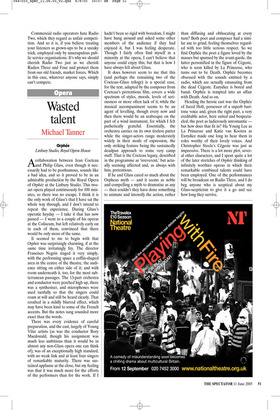Wasted talent
Michael Tanner
Orphée Linbury Studio, Royal Opera House Acollaboration between Jean Cocteau and Philip Glass, even though it necessarily had to be posthumous, sounds like a bad idea, and so it proved to be in an admirable production by the Royal Opera of Orphée at the Linbury Studio. This twoact opera played continuously for 100 minutes, so there was no escape. I think it is the only work of Glass’s that I have sat the whole way through, and I don’t intend to repeat the experience. During Glass’s operatic heyday — I take it that has now passed — I went to a couple of his operas at the Coliseum, but left relatively early on in each of them, convinced that there would be only more of the same.
It seemed to me to begin with that Orphée was surprisingly charming, if at the same time irritatingly fey. The director Francisco Negrin staged it very simply, with the performing space a coffin-shaped area in the centre of the theatre, the audience sitting on either side of it; and with room underneath it, too, for the most subterranean passages. The 13-part orchestra and conductor were perched high up, there was a synthesiser, and microphones were used tactfully so that the singers could roam at will and still be heard clearly. That resulted in a mildly blurred effect, which may have been kind to some of the French accents. But the notes sung sounded more exact than the words.
There was every evidence of careful preparation, and the cast, largely of Young Vilar artists (as was the conductor Rory Macdonald, though his assignment was much less ambitious than it would be in almost any non-Glass opera one can think of), was of an exceptionally high standard, with no weak link and at least four singers of remarkable maturity. There was sustained applause at the close, but my feeling was that it was much more for the efforts of the performers than for the work. If I hadn’t been so rigid with boredom, I might have hung around and asked some other members of the audience if they had enjoyed it, but I was feeling desperate. Though I fairly often find myself in a minority at the opera, I can’t believe that anyone could enjoy this; but that is how I have always felt about Glass.
It does however seem to me that this (and perhaps the remaining two of the Cocteau–Glass trilogy) is a special case, for the text, adapted by the composer from Cocteau’s pretentious film, covers a wide spectrum of styles, moods, levels of seriousness or more often lack of it, while the musical accompaniment seems to be an agent of levelling, though every now and then there would be an arabesque on the part of a wind instrument, for which I felt pathetically grateful. Essentially, the orchestra carries on its own tireless patter while the singer-actors range moderately widely in their mode of expression, the only striking feature being the sustainedly deadpan approach to some very camp stuff. That is the Cocteau legacy, described in the programme as ‘irreverent,’ but actually seeming affected and, as always with him, pretentious.
If he and Glass cared so much about the Orpheus myth — and it seems as noble and compelling a myth to dramatise as any — then couldn’t they have done something to animate and intensify the action, rather than diffusing and obfuscating at every turn? Both poet and composer had a similar axe to grind, feeling themselves regarded with too little serious respect. So we find Orphée the poet a figure loved by the masses but spurned by the avant-garde, the latter personified in the figure of Cégeste, who is soon killed by La Princesse, who turns out to be Death. Orphée becomes obsessed with the sounds emitted by a radio, which are actually emanating from the dead Cégeste. Eurydice is bored and banal. Orphée is tempted into an affair with Death. And so on.
Heading the heroic cast was the Orphée of Jared Holt, possessor of a superb baritone voice and, given the right part, a very creditable actor, here suited and bespectacled, the poet as ludicrously unromantic but how does that fit in? Ha Young Lee as La Princesse and Katie van Kooten as Eurydice made one long to hear them in roles worthy of their lovely voices. And Christopher Steele’s Cégeste was just as impressive. There is a lot more plot, several other characters, and I spent quite a lot of the later stretches of Orphée thinking of infinitely worthier operas in which their remarkable combined talents could have been employed. One of the performances will be broadcast on Radio Three, and I do beg anyone who is sceptical about my Glass-scepticism to give it a go and see how long they survive.


















































 Previous page
Previous page